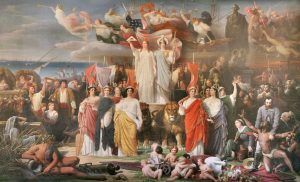Ilana Masad in The Paris Review:
It didn’t have to be this way.
 This thought kept blinking through my mind, like a neon sign on a dark street, as I read These Truths, the newest book by Harvard professor and The New Yorker contributor Jill Lepore. A 900-plus page tome, it is a full history of the United States, a country I was born in and soon after left. I was raised in a much younger country, Israel, which was handed over by a colonizing force to a people desperate for a home, back in the days—not so long ago, really—when colonizers could simply gift the land they’d taken as if it were theirs to give. The history I was taught from the ages of six to eighteen was both condensed and elongated, the history of a fledgling country full of war but also of an ancient people once enslaved and long persecuted.
This thought kept blinking through my mind, like a neon sign on a dark street, as I read These Truths, the newest book by Harvard professor and The New Yorker contributor Jill Lepore. A 900-plus page tome, it is a full history of the United States, a country I was born in and soon after left. I was raised in a much younger country, Israel, which was handed over by a colonizing force to a people desperate for a home, back in the days—not so long ago, really—when colonizers could simply gift the land they’d taken as if it were theirs to give. The history I was taught from the ages of six to eighteen was both condensed and elongated, the history of a fledgling country full of war but also of an ancient people once enslaved and long persecuted.
But I was born in the U.S., which makes me a citizen. I didn’t have to pass a test, or learn about this country, or understand any more of it than any non-American understands about the place that gave us McDonalds, the internet, the iPhone. I moved back here easily, when I was 19 years old. My birth certificate sufficed, my ignorance was never questioned or corrected. What are the myths the United States has it built itself on? Lepore’s question—the one the book explores—is more honed, adopted from statements by Alexander Hamilton: “Can a political society really be governed by reflection and election, by reason and truth, rather than by accident and violence, by prejudice and deceit?” Lepore’s answer is something like: Well, sometimes yes, and sometimes no, and, in the past few decades, it kind of depends on who’s being asked.
When I set out to read this book and write this article, I had a general understanding of how the United States of America came to be. I knew about the founding fathers (though couldn’t name them all; like Disney’s seven dwarves, I always forgot at least one). I knew that this land wasn’t empty, or fallow, or wasted—it was settled, and loved, and well-cared for by the peoples native to it long before Europeans landed on its shores. I knew about the terrible legacy of slavery, of the millions of human beings forced onto ships, across oceans, onto land, where they were treated horribly, worked to death, and yet survived, generation after generation.
More here.
